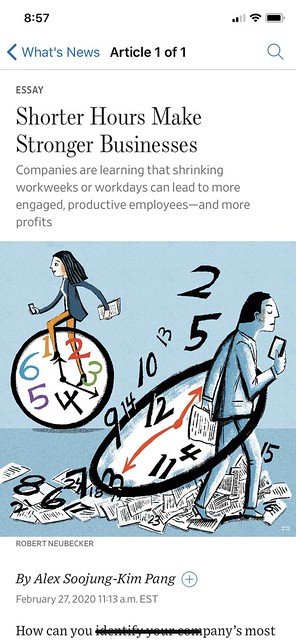My piece explaining why “Shorter Hours Make Stronger Businesses” is out in the Wall Street Journal.
This is one of those short pieces that we ended up spending a lot of time on, but it was well worth it.
How can you identify your company’s most dedicated, creative workers, the ones best able to embrace challenges and adapt to changes? Ask them to work a shorter week without reducing their salaries.
In the past year, a few companies have received attention for reducing working hours, but a movement has been building for years. In Sweden, mechanics at the Toyota Gothenburg service center have worked 6-hour shifts and 30-hour weeks since 2003. AE Harris, a Birmingham, U.K. steelmaker, began a 36-hour, four-day week in 2006. Australian software company Icelab moved to 32-hour, four-day weeks two years later. Korean e-commerce giant Woowa Brothers, in an industry notorious for long workweeks, has gradually shrunk to 35 hours.
Obviously, employees benefit when companies shorten working hours. But it turns out that companies can benefit, too. Making the change spurs staffs to collaborate more effectively, prioritize more ruthlessly and develop deep respect for one another’s time. Leaders gain time to scan the horizon, incubate new ideas and recover from their weekly pressures.
Of course, this doesn’t work everywhere. Some companies find it too disruptive. Financial setbacks can push companies to forego experimenting and return to traditional schedules. Industries that depend on billing clients by the hour may never make the jump.
But I’ve studied more than a hundred companies in different countries and sectors that have shortened their days or weeks without sacrificing productivity or profitability—and often improving both. If done right, shorter hours can help companies flourish.
What sets these firms on a different path? Company founders, having done their share of weekends and all-nighters, often encounter a crisis that spurs a change. For example, chef Stuart Ralston worked for Gordon Ramsay and then opened his own restaurant in Edinburgh, but after three years of long hours trying to make it a success, he shifted himself and his employees to four-day weeks in 2018. “I was losing too much of myself and my family time,” he said.
To get started, companies look at their weekly revenues to decide whether to close during their slowest day or reduce their opening hours. (Many find they do comparatively little client business or shipping on Fridays.) Businesses can then turn to internal changes to become more efficient—for instance, by making meetings shorter and confining them to specific periods of the day. They set new rules to reduce distractions. At the Copenhagen-based consultancy IIH Nordic, workers are given noise-cancelling headphones and special music to help them concentrate; red lights and timers on desks signal when an employee is heads-down and shouldn’t be disturbed.
Companies develop new cultural norms around time. Garages and nursing homes shorten shifts but enforce on-time arrival and reduce breaks. When he implemented a five-hour day at Blue Street Capital in Huntington Beach, Calif., CEO David Rhoades banned impromptu “Got a minute?” meetings to reduce distractions. Companies treat working overtime as a problem rather than a virtue: At Woowa Brothers, managers now call that a sign of poor planning, not proof of an employee’s dedication.
Companies let employees find their own ways to work more efficiently. Workers with shorter hours tend to spend less time socializing informally but more often get together after work. Boundaries between work and personal time get stronger.
Organizational and cultural changes allow companies to maintain the same levels of productivity and profitability—or raise them. Microsoft Japan made waves in November by reporting that productivity rose nearly 40% during a summer trial of four-day weeks, while electricity costs dropped 23%. Woowa Brothers said that its revenue grew 10-fold during three years of shortening hours. The Glasgow call center Pursuit Marketing said that productivity rose by 30% with a four-day week.
Shorter hours can also bring companies other benefits.
More camaraderie. We tend to think that long hours help to forge closer teams. But rising to the challenge of figuring out how to do five days’ work in four, breaking down and rebuilding jobs, building a new culture and doing something that many people would regard as impossible, brings employees together and increases their loyalty to each other and the company.
More independent thinking. Shortening the workweek can make employees more invested in the company’s fortunes, encouraging them to innovate. After moving to a four-day week at the San Diego real-estate firm The Goodall Group, employees started developing new initiatives and experiments to get things done more effectively. “They started to feel more like owners,” founder Steve Goodall says. “All I did was give them a day off.”
Better recruitment and retention. Companies with shorter hours attract top talent. Japanese groupware company Cybozu says that shorter workweeks help them to compete with Microsoft and Samsung. At the Glebe, a Virginia nursing home, annual turnover among nurses’ aides fell from 128% to 44% after they moved to a 30-hour week.
Narrower gender gaps. Working mothers are sought after by businesses with shortened hours that need employees who can prioritize, maintain work-life boundaries and take commitments seriously. Chris Downs, co-founder of the London design firm Normally, says that his firm’s four-day week “makes it possible for brilliant, experienced, super-focused and productive women to come back into work and not feel any less than anyone else in that situation.” And everybody works a shorter week, so parents aren’t stigmatized for leaving work early.
For many industries, we should no longer argue about whether the four-day week or six-hour day could work. Instead the questions are how companies will make it work. As Anna Ross, CEO of the Australian cosmetic company Kester Black, put it, “We work four days a week because, after a three-day weekend, anything is possible.” It’s time for more companies to make the same discovery.
